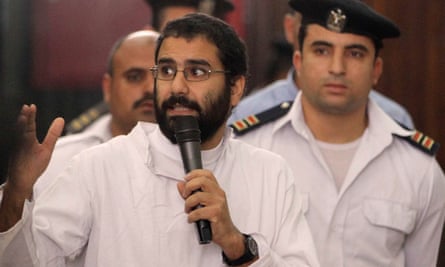[ad_1]
Britain’s Middle East minister says he does not know whether the jailed hunger striker Alaa Abd el-Fattah is still alive, and says Egypt’s refusal to allow British consular access is unacceptable.
Speaking in the House of Lords, Lord Ahmad also said the failure of the Egyptian government to cooperate over the British-Egyptian prisoner would have “a massive bearing” over Britain’s future relationship with Egypt.
Pressed by members of the Lords to spell out those consequences, including whether Britain would withdraw from the British-Egyptian trade agreement, Ahmad steered clear of a direct answer.
He said he had been in touch with the family, as well as the Egyptian ambassador to the UK, over the past week, and his tone suggested he was increasingly exasperated by Egypt’s refusal even to acknowledge that Abd el-Fattah was a British citizen.
Ahmad said: “The fact that we want consular access is not something that we have dreamed up. It is something that should be granted as a matter of fact. On the issue of proof of life, I know that their mother is outside the jail asking for the weekly letter [from her son]. What is required urgently is confirmation of that very issue.
“I do not want to beat around the bush in any way: while there has been constructive engagement, we have not yet been granted consular access. That is unacceptable.”
The Liberal Democrat peer Lord Purvis of Tweed demanded the government spell out the practical consequences of Egypt’s failure to engage. He said: “There is a UK-Egypt association agreement that offers preferential trading with the UK to Egypt. There are mechanisms to pause this agreement on the basis of human rights abuses. Will the government now indicate to Egypt that we intend to pause those preferential trading arrangements until proper consular access to a British citizen can be provided to the UK?”

Lady Boycott, who had raised the issue, said: “The family have no idea whether he is being force-fed and no idea what conversations took place between our prime minister and President Sisi when they met in Sharm el-Sheikh earlier this week. I find it hard to believe, as he is a British citizen who is very likely to die – indeed, as I speak, he may well be dead – that we cannot apply some more pressure to rescue this extremely important man. It actually would not matter who he was: he is a British citizen in serious trouble.”
Rishi Sunak gave no details at prime minister’s questions in Westminster of how his meeting with Egypt’s president had gone.
Sanaa Seif, Abd el-Fattah’s sister, who is attending Cop27, said on Twitter: “It’s been 74 hours since my brother stopped taking water. For the third day in a row my mother is standing outside the prison gates asking for news. We know nothing. Is he handcuffed to a bed and put on IVs? Is he still alive? Could the officials attending Cop27 demand proof of life?”
Laila Soueif, Abd el-Fattah’s mother, returned to the Wadi al-Natrun prison for a third day to try to get news of her son. “The Egyptian authorities, with so much blood on their hands, probably think they can get away with one more crime. They could be right. What difference can one more death inside a prison cell make?” she wrote on social media. “So I direct my words to others, to the British prime minister and to all these heads of state congregating in Sharm el-Sheikh. If Alaa dies you, too, will have blood on your hands, and you claim to represent countries where every life counts.”
David Lammy, the shadow foreign secretary, told BBC Radio 4 that “we have a £4bn trading partnership with Egypt, that is tremendous leverage. Why has it taken months and months for the Foreign Office to act?”
Lammy said the Egyptian ambassador should be denied access to Whitehall because of the handling of Abd el-Fattah’s case. “UK officials in Egypt have no consular access to this British national and you’ve got to ask why is it that the Egyptian ambassador has access to Whitehall in those circumstances – I think it should stop,” he said.
[ad_2]




